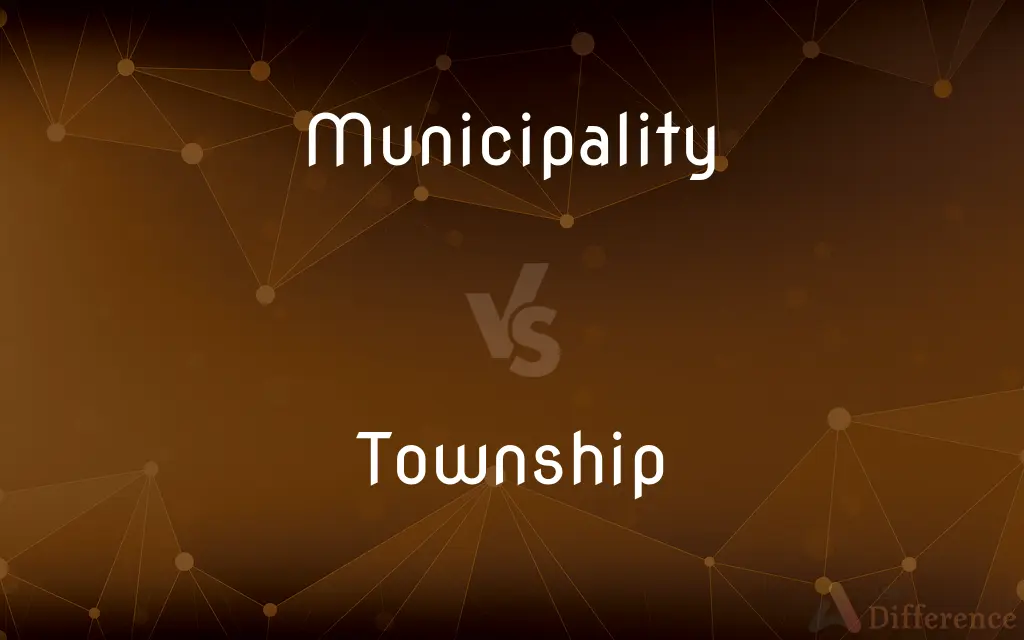Municipality vs. Township — What's the Difference?
Edited by Tayyaba Rehman — By Urooj Arif — Updated on April 8, 2024
Municipalities are administrative regions with their own governments, typically encompassing cities or towns, while townships are subdivisions of counties with less autonomous governance.

Difference Between Municipality and Township
Table of Contents
ADVERTISEMENT
Key Differences
Municipalities and townships both play critical roles in local governance but differ in their structures and powers. Municipalities, encompassing cities, towns, or villages, have self-governing powers granted by the state, including the ability to enact local ordinances, levy taxes, and provide essential services like police and fire departments, and public works. Townships, on the other hand, are generally subdivisions of a county, serving rural or suburban areas, with governance that often includes a board of trustees and limited authority, focusing on providing basic services such as road maintenance and land use planning.
Municipalities often have broader powers than townships, including more comprehensive zoning, regulatory authority, and the ability to provide a wider range of services. They may operate utilities, parks, and recreation facilities, whereas townships usually have more limited service provisions, focusing on essential services and sometimes contracting with municipalities or counties for others.
The organizational structure of municipalities typically includes a mayor-council, council-manager, or commission system, offering a more complex governance model with separate executive and legislative branches. In contrast, townships often operate with a simpler structure, usually managed by an elected board of trustees or supervisors, reflecting their smaller scale and narrower focus.
Funding mechanisms for municipalities and townships also vary, with municipalities having broader taxation powers, including property taxes, sales taxes, and income taxes, to support their wide-ranging services. Townships usually rely on property taxes and state or federal grants, with less autonomy in generating revenue, which influences their capacity to offer services.
Comparison Chart
Definition
An administrative entity with its own government, providing a wide range of services.
A subdivision of a county with limited self-governance, focusing on basic services.
ADVERTISEMENT
Governance
Can include mayor-council, council-manager, or commission systems.
Often governed by a board of trustees or supervisors.
Services Provided
Offers a broader range of services, including utilities, public safety, and recreation.
Focuses on basic services like road maintenance and land use planning.
Regulatory Authority
Has broader powers for zoning and local regulations.
Limited regulatory authority, primarily for land use and road maintenance.
Revenue Sources
Can levy taxes (property, sales, income) and fees for comprehensive services.
Relies mainly on property taxes and grants, with limited taxation powers.
Compare with Definitions
Municipality
The governing body of such a unit.
The municipality approved new funding for road improvements.
Township
A geographic area in some states, designated for land surveys.
The township was established as part of the state's early land survey system.
Municipality
A city or town that has corporate status and local government.
The municipality organizes annual cultural festivals to promote local heritage.
Township
An area of land designated as a distinct administrative and tax entity.
The township boundaries have remained unchanged for decades.
Municipality
Any urban administrative division, regardless of size or population.
The new public library is a project initiated by the municipality.
Township
A subdivision of a county with some self-government.
The township trustees voted to upgrade the community center.
Municipality
An urban administrative division having corporate status and powers of self-government.
Our municipality recently passed a law to reduce plastic use.
Township
A rural or suburban community, not incorporated as a city or town.
Our township is known for its annual fall festival.
Municipality
A political unit with corporate status and usually its own local government.
The municipality of Springfield was awarded a grant for park development.
Township
The jurisdiction of a township government.
Road maintenance is a significant responsibility of our township.
Municipality
A municipality is usually a single administrative division having corporate status and powers of self-government or jurisdiction as granted by national and regional laws to which it is subordinate. The term municipality may also mean the governing or ruling body of a given municipality.
Township
A township is some kind of human settlement or administrative subdivision, with its meaning varying in different countries. While the term is occasionally associated with an urban area, this tends to be an exception to the rule.
Municipality
A political unit, such as a city, town, or village, incorporated for local self-government.
Township
A subdivision of a county in most northeast and Midwest US states, having the status of a unit of local government with varying governmental powers.
Municipality
A body of officials appointed to manage the affairs of a local political unit.
Township
A public land surveying unit of 36 sections or 36 square miles.
Municipality
A district with a government that typically encloses no other governed districts; a borough, city, or incorporated town or village.
Township
An ancient administrative division of a large parish in England.
Municipality
The governing body of such a district.
Township
A suburb or city in South Africa formerly designated by the government as a predominantly black residential area.
Municipality
(politics) In Mexico and other Spanish- and Portuguese-speaking countries, second-level administrative divisions that may house one or more cities or towns whose head of government may be called mayors or, in Mexico, municipal presidents.
Township
The territory of a town.
Municipality
A municipal district; a borough, city, or incorporated town or village.
Township
A subdivision of a county.
Municipality
An urban district having corporate status and powers of self-government
Township
An area set aside for nonwhite occupation.
Municipality
People living in a town or city having local self-government
Township
A nonwhite (usually subeconomic) area attached to a city.
Township
A small town.
Township
The district or territory of a town.
Township
In surveys of the public land of the United States, a division of territory six miles square, containing 36 sections.
Township
In Canada, one of the subdivisions of a county.
Township
An administrative division of a county;
The town is responsible for snow removal
Common Curiosities
What is a municipality?
A municipality is an administrative entity with its own government, responsible for providing local services and infrastructure.
Do municipalities have more services than townships?
Yes, municipalities usually provide a broader range of services, including public safety, utilities, and recreational facilities, compared to the basic services provided by townships.
Can townships levy taxes?
Townships can levy taxes, but their powers are usually more limited compared to municipalities, often relying on property taxes and state or federal grants.
What is a township?
A township is a subdivision of a county with some level of self-government, focusing on basic services like road maintenance.
Can a township become a municipality?
Yes, a township can become a municipality if it meets certain criteria set by the state, such as population size and infrastructure, and through a legal incorporation process.
How do municipalities and townships differ in governance?
Municipalities often have more complex governance structures, such as mayor-council or council-manager systems, while townships typically are governed by a board of trustees.
How do funding sources differ between municipalities and townships?
Municipalities have broader taxation powers and can generate revenue through various taxes and fees, while townships mainly rely on property taxes and grants.
What role do townships play in rural areas?
Townships provide essential services like road maintenance and land use planning in rural areas, often serving as the primary local government.
How does zoning differ between municipalities and townships?
Municipalities typically have broader zoning powers to control land use and development, while townships focus on basic land use planning and regulations.
Are there areas covered by both a municipality and a township?
In some states, areas can be part of both a municipality and a township, leading to overlapping services and taxes.
How do municipalities and townships contribute to local government?
Both play crucial roles in local governance, with municipalities focusing on urban areas and townships serving more rural or suburban communities.
Can townships enforce local ordinances?
Townships have the authority to enforce local ordinances, but their regulatory scope is usually more limited compared to municipalities.
Are municipalities considered local government?
Yes, municipalities are a form of local government, providing services and governance at the city or town level.
What is the main advantage of living in a municipality?
Living in a municipality offers access to more comprehensive services, including emergency services, utilities, and cultural events.
What is the main advantage of living in a township?
Townships often offer a more rural or suburban living environment, with lower taxes and a focus on community and local governance.
Share Your Discovery

Previous Comparison
Toolbox vs. Toolkit
Next Comparison
Empty vs. BlankAuthor Spotlight
Written by
Urooj ArifUrooj is a skilled content writer at Ask Difference, known for her exceptional ability to simplify complex topics into engaging and informative content. With a passion for research and a flair for clear, concise writing, she consistently delivers articles that resonate with our diverse audience.
Edited by
Tayyaba RehmanTayyaba Rehman is a distinguished writer, currently serving as a primary contributor to askdifference.com. As a researcher in semantics and etymology, Tayyaba's passion for the complexity of languages and their distinctions has found a perfect home on the platform. Tayyaba delves into the intricacies of language, distinguishing between commonly confused words and phrases, thereby providing clarity for readers worldwide.
















































